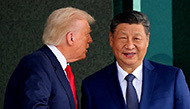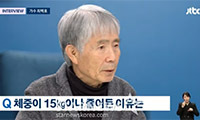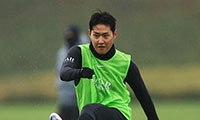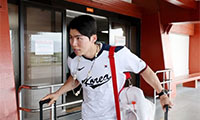Staff Reporter
SEOUL Korea’s English education is expected to take a historic step, as English classes will be conducted exclusively in English starting from the upcoming spring semester.
Initially, the beneficiaries of the education reform will be first grade students at middle schools and third and fourth graders in elementary schools.
The step followed the curriculum modification by the education authorities, who decided to put more weight on English conversation than on reading and writing, starting from March 1, the beginning of the 2001 school year.
Korea’s reading-oriented English education has come under fire for failing to help students develop practical English skills.
The Education Ministry said yesterday that it instructed 16 boards of education nationwide to assign English teachers for the new semester based on the principle of ``English classes in English.’’
Accordingly, middle school teachers will have to conduct such lessons for all first grade English classes, or three hours a week, and elementary school teachers must do so for third and fourth graders for one hour a week. .
"The new curriculum is designed to improve practical English abilities from childhood with conversation-oriented textbooks, which are composed of English games, role-playing, and so on,’’ said Song Yong-sup, who is in charge of school education policy at the ministry.
He added that, ``Still, there are not many teachers who can conduct classes exclusively in English. Each school is required to assign qualified English instructors to those required classes.’’
But, some progressive teachers’ groups voiced concerns that the new English class system will not be successful, saying that it is a good experiment but too unrealistic considering Korean educational conditions.
``
Many English teachers are afraid of speaking English, so it can produce side effects. Teachers who have a poor command of English might be discouraged, while prompting students to turn to private tutoring for better English conversation skills,’’ said one teacher from the Korean Teachers and Educational Workers’ Union (KTU), better known as Chonkyojo in Korean.
A recent poll by the ministry showed that as many as 5,000, including 2,781 from elementary schools, among a total of 67,464 primary, middle and high school English teachers, are capable of conducting classes in English.
Others were found to be unable to provide such an educational environment for their students due to lack of conversation skills.
In a bid to solve those problems, the education authority plans to increase its budget for research and development of English education methods and textbooks, as well as offer more than 10,000 teachers the opportunity to study abroad.
The ministry also plans to raise the number of native English teachers to 241 this year from 136 in 2000.
The ministry intends to expand the application of ``English classes in English’’ to middle school second graders and high school first graders in 2002, and then to middle school seniors and the second graders at high schools in 2003.
High school seniors will receive English education in English starting from 2004.
lcd@koreatimes.co.kr
?
스마터리빙
more [ 건강]
[ 건강]이제 혈관 건강도 챙기자!
[현대해운]우리 눈에 보이지 않기 때문에 혈관 건강을 챙기는 것은 결코 쉽지 않은데요. 여러분은 혈관 건강을 유지하기 위해 어떤 노력을 하시나요?
 [ 건강]
[ 건강]내 몸이 건강해지는 과일궁합
 [ 라이프]
[ 라이프]벌레야 물럿거라! 천연 해충제 만들기
 [ 건강]
[ 건강]혈압 낮추는데 좋은 식품
[현대해운]혈관 건강은 주로 노화가 진행되면서 지켜야 할 문제라고 인식되어 왔습니다. 최근 생활 패턴과 식생활의 변화로 혈관의 노화 진행이 빨라지고
사람·사람들
more
[한인단체 신년 인터뷰] KYCC 송정호 관장… “지역사회 위한 종합 서비스 강화”
LA 한인타운 대표 비영리단체 한인타운청소년회관(KYCC)의 송정호 관장은 “지금 우리가 하는 일은 커뮤니티 ‘니즈’가 있기 때문에 존재한다”…

[한인단체 신년 인터뷰] LA 평통 장병우 회장… “본연 역할로 한반도 평화 실질 기여”
민주평화통일자문회의 LA협의회(이하 LA 평통) 장병우 회장은 6일 본보와의 신년 인터뷰에서 붉은 말의 해인 병오년 새해를 맞아 신년 화두로 …
워싱턴주에 첫 한인 시의장
워싱턴주에서 첫 한인 시의회 의장이 탄생했다. 제이슨 문(한국명 문태원) 머킬티오 시의원이 새해 들어 시의장으로 선출되며 또 하나의 중책을 맡…
국회 방문단 대한인국민회 방문
윤후덕·이해식·김한규 의원과 조오섭 국회의장 비서실장 등 10여 명의 한국 국회방문단이 지난 5일 LA를 찾아 로즈데일 묘지와 국민회관 등 미…
[한인단체 신년 인터뷰] 명원식 파바월드 회장… …
“한인 차세대들이 바르게 자랄 수 있는 토대를 만드는 것이 제가 파바월드의 회장으로 존재하는 유일한 이유입니다”한인사회의 대표적 청소년 봉사 …
많이 본 기사
- 국토안보부, ‘시위 확산’ 미네소타에 법집행인력 추가 파견
- 미국은 ‘뇌’, 중국은 ‘몸’…체제가 된 AI
- FBI국장 “지난해 북중러 등 적국 스파이 체포, 전년比 35%↑”
- 크리스 라이트 에너지장관 “베네수 석유산업 美개입 확대해 생산량 늘릴것”
- 대북대화 ‘바늘구멍’ 뚫던 중 변수 … 1
- 구글-월마트 ‘AI 쇼핑’ 손잡아… “챗봇과 대화중 상품 결제 가능”
- 최백호, 핼쑥한 얼굴로 등장 “호흡기 병으로 15kg 빠져”
- 도피성출국 김경, 귀국 4시간만에 경찰로…강선우 1억의혹 조사
- 장동혁 “與공천헌금 특검법 야권 회동에 조국 대표도 동참하길”
- ‘김건희일가 양평 도로 의혹’ 국토부 서기관 재판 내달 시작
- 트럼프의 ‘흑역사 지우기’?…국립박물관서 잇달아 탄핵소추 삭제
- 美, 남아공 해상 ‘브릭스 군사훈련’ 주시… “이익 지킬 것”
- 국토안보부, ‘시위 확산’ 미네소타에 법집행인력 추가 파견
- 박나래 갑질 논란, 새 국면..前매니저 거짓말 정황→오열 녹취록
- 사우디에 트럼프골프장·호텔…트럼프 가족회사, 100억달러 사업
- 마두로 체포 특수작전이 부러운 中… “오랜 추구에도 한계”
- 이스라엘, 트럼프 대이란 군사작전 가능성에 경계태세 돌입
- 트럼프 “美가 베네수 보호…이젠 베네수→쿠바 석유·돈 안갈것”
- “러시아가 보호해주려나…” ‘그림자’ 유조선 美 피해 선적 변경
- ‘돌돌싱’ 이지현, 두 아이와 韓 떠났다.. “미국에서 공부”
- 美 식이지침 포함된 김치… ‘마이크로바이옴’ 건강에 무슨 역할?
- “트럼프의 그린란드 위협, 소련의 동맹 침공 역사 소환”
- “트럼프, 이란 군사타격 선택지 보고받아…최종결정 고심중”
- ‘날벼락’ 김혜성 WBC 사이판 가 있는데→LAD 갑작스러운 ‘경쟁자 2명 영입 확정’ 주전 경쟁 더 험난해지나
- 장원영 웃고 안성재 울린 ‘두쫀쿠’ 열풍..뭐길래?
- 션, ♥정혜영 쏙 빼닮은 미모의 막내딸 공개.. “주위에서 배우시키라고 해”
- 이강인 주전 파란불 ‘경쟁자 한 명 떠난다’... 아스널, ‘PSG 특급 재능’ 바르콜라 영입 근접
- “손흥민 제발 돌아와 줘” 단기 임대론 또 급부상... ‘14위 추락’ 토트넘 위기, 에이스 쿠두스마저 3개월 아웃
- 이란 대통령 “美·이스라엘이 혼란 조장, 폭도가 사회 파괴”
- 카리브해 ‘트럼프 눈독’ 속 멕시코 유조선 쿠바로 입항
- 머스크 “X 알고리즘 일주일뒤 전면 공개…4주마다 업데이트”
- 김여정 “명백한건 한국발 무인기의 영… 1
- ‘트럼프 간판’ 싫어서…케네디센터 5… 1
- 美방문 통상본부장 “쿠팡 문제, 통상·외교 이슈와 분리돼야”
- “교황청, 美대사 불러 막판까지 ‘마… 1
- 작년 한국의 1인당 GDP 3만6천달러 턱걸이한 듯…3년 만에 뒷걸음
- [CES 결산] 화면 넘어 일상으로…실물AI가 열어젖힌 로봇·자율주행 시대
- ‘ICE총격’에 주말 미 전역 시위…… 2
- 이란 시위 사망자 폭증… “2천명 넘게 숨졌을 가능성도”
- ‘中 절망’ 안세영 우승 막을 ‘유일 천적’, 이유도 모르는 ‘충격 기권’... “미리보는 결승이었는데”
- 美, 미군 공격한 시리아 IS에 대규모 보복 공습
- 젠슨 황 “AI종말론, 사회에 해악… ‘AI 안전’ 투자조차 위축시켜”
- 트럼프 “내놔라” 그린란드 “나간다”…딜레마 빠진 덴마크
- 김민재 “EPL 안 가요” 첼시 450억 제안 거절 ‘속사정은?’
- 트럼프, 對이란 군사개입가능성 질문에 “강력한 선택지 검토중”
- 트럼프 “이란, 자유 바라보고 있다…미 도울 준비 돼있어”
- 송혜교, 한 해의 시작에서.. “마지막 출근”
- 그린란드 정당들 “미국인도, 덴마크인도 되고 싶지 않다”
- [특파원 시선] 트럼프를 보며 ‘마석… 3
- 李대통령 “민간 무인기 사실이면 중대… 2
1/5지식톡

-
 미 육군 사관학교 West Poin…
0
미 육군 사관학교 West Poin…
0https://youtu.be/SxD8cEhNV6Q연락처:wpkapca@gmail.comJohn Choi: 714-716-6414West Point 합격증을 받으셨나요?미 육군사관학교 West Point 학부모 모…
-
 ☝️해외에서도 가능한 한국어 선생님…
0
☝️해외에서도 가능한 한국어 선생님…
0이 영상 하나면 충분합니다!♥️상담신청문의♥️☝️ 문의 폭주로 '선착순 상담'만 진행합니다.☎️ : 02-6213-9094✨카카오톡ID : @GOODEDU77 (@골뱅이 꼭 붙여주셔야합니다…
-
 테슬라 자동차 시트커버 장착
0
테슬라 자동차 시트커버 장착
0테슬라 시트커버, 사놓고 아직 못 씌우셨죠?장착이 생각보다 쉽지 않습니다.20년 경력 전문가에게 맡기세요 — 깔끔하고 딱 맞게 장착해드립니다!장착비용:앞좌석: $40뒷좌석: $60앞·뒷좌석 …
-
 식당용 부탄가스
0
식당용 부탄가스
0식당용 부탄가스 홀세일 합니다 로스앤젤레스 다운타운 픽업 가능 안녕 하세요?강아지 & 고양이 모든 애완동물 / 반려동물 식품 & 모든 애완동물/반려동물 관련 제품들 전문적으로 홀세일/취급하는 회사 입니다 100% …
-
 ACSL 국제 컴퓨터 과학 대회, …
0
ACSL 국제 컴퓨터 과학 대회, …
0웹사이트 : www.eduspot.co.kr 카카오톡 상담하기 : https://pf.kakao.com/_BEQWxb블로그 : https://blog.naver.com/eduspotmain안녕하세요, 에듀스팟입니다…
케이타운 1번가
오피니언

무분별 이민 단속이 불러온 비극

무면허 건축업자 피해 근절돼야
 메건 매카들 워싱턴포스트 칼럼니스트
메건 매카들 워싱턴포스트 칼럼니스트 [메건 매카들 칼럼] 마두로는 체포했지만… 베네수엘라 석유 생산 회복은?
 김미선 서북미문인협회 회장시인
김미선 서북미문인협회 회장시인 [한국춘추] 새해, 북방의 한국인을 생각하며
 김인자 시인·수필가
김인자 시인·수필가 [금요단상] 2026년을 맞이하며
 최형욱 / 서울경제 논설위원
최형욱 / 서울경제 논설위원 [만화경] 선거용 볼모 된 새만금
 최호근 / 고려대 사학과 교수
최호근 / 고려대 사학과 교수 [역사속 하루] 1938년 1월 3일 소아마비극복재단 출범
 이상희 UC 리버사이드 교수 인류학
이상희 UC 리버사이드 교수 인류학 오렌지 상자와 함께하는 2026년
 오세정 서울대 물리천문학부 명예교수·전 총장
오세정 서울대 물리천문학부 명예교수·전 총장 [오세정 칼럼] 병오년 새해, 한국의 과제
1/3지사별 뉴스

“2세 아동도 무상교육”⋯ 맘다니 1호 무상정책 시동
뉴욕시가 앞으로 모든 2세 아동을 대상으로 무상 보육을 제공키로 했다.부자 증세, 임대료 동결, 무상 보육, 무상 버스 등의 공약으로 돌풍을 …
연방하원, 오바마케어 보조확대 3년 연장안 통과

워싱턴 지역 ‘연방정부 일자리’ 7만2천여개 사라져
지난해 워싱턴 지역에서 총 7만2천개 이상의 연방정부 관련 일자리가 없어진 것으로 나타났다.연방 노동통계국(BLS)이 7일 발표한 실업률 자료…
오바마케어 보험료 납부 ‘대혼란’

국토안보부, ‘시위 확산’ 미네소타에 법집행인력 추가 파견
미네소타주 미니애폴리스에서 이민세관단속국(ICE) 요원의 민간인 총격 사망 사건이 발생한 이후 주요 도시에서 반발 시위가 확산하는 가운데 국토…
살림으로 뿌리내리다- 테이크루트 안미정 대표의 요리 이야기 (9)

오늘 하루 이 창 열지 않음 닫기 


















































.png)


댓글 안에 당신의 성숙함도 담아 주세요.
'오늘의 한마디'는 기사에 대하여 자신의 생각을 말하고 남의 생각을 들으며 서로 다양한 의견을 나누는 공간입니다. 그러나 간혹 불건전한 내용을 올리시는 분들이 계셔서 건전한 인터넷문화 정착을 위해 아래와 같은 운영원칙을 적용합니다.
자체 모니터링을 통해 아래에 해당하는 내용이 포함된 댓글이 발견되면 예고없이 삭제 조치를 하겠습니다.
불건전한 댓글을 올리거나, 이름에 비속어 및 상대방의 불쾌감을 주는 단어를 사용, 유명인 또는 특정 일반인을 사칭하는 경우 이용에 대한 차단 제재를 받을 수 있습니다. 차단될 경우, 일주일간 댓글을 달수 없게 됩니다.
명예훼손, 개인정보 유출, 욕설 등 법률에 위반되는 댓글은 관계 법령에 의거 민형사상 처벌을 받을 수 있으니 이용에 주의를 부탁드립니다.
Close
x